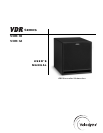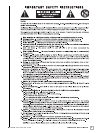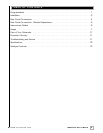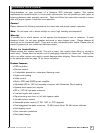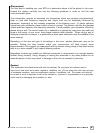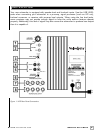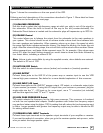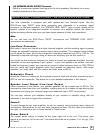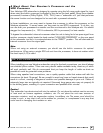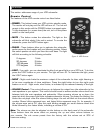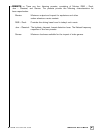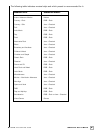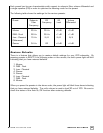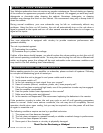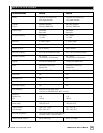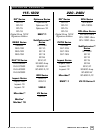
6
.
www.velodyne.com
VDR Series User’s Manual
A Word About Your Receiver’s Crossover and the
VDR Crossover
Y
our Velodyne VDR subwoofer is designed to operate using the full range audio signal for input
when using the built-in crossover (controlled by the dial on the back panel). Many home theater
processors/receivers (Dolby Digital
®
, DTS
®
, THX
®
) have a “subwoofer out” jack that performs
this same function and are designed to be used with a powered subwoofer.
In these installations, you may want to bypass the crossover in either the processor or the
Velodyne subwoofer. In some cases, you may want to use BOTH crossovers. To do this, you
can use both your processor’s crossover and the one internal to the Velodyne sub. You should
stagger the frequencies (i.e., 120 Hz subwoofer, 80 Hz processor) for best results.
To bypass the subwoofer’s internal crossover when the unit is being fed a low pass signal from
another crossover, simply locate the knob marked “LOW-PASS CROSSOVER” on the rear panel
of the subwoofer and turn it counterclockwise to the “DIRECT” position. This will eliminate the
internal crossover from the signal path.
Note:
When not using an external crossover, you should use the built-in crossover for optimal
performance. When using a single RCA sub out from the processor, it does not matter which
line level input (L/R) is used.
When installing your new Velodyne subwoofer using the line-level connections, you should always
use shielded phono cables. There are many decent cables available today, most any of which
will work perfectly well. W
e do recommend that you keep the length of cable as short as
possible to avoid any potential noise problems.
When using speaker level connections, use a quality speaker cable that mates well with the
connectors (at least 14-gauge). Be ver
y car
eful to avoid any loose or frayed strands that could
result in a short, causing a dangerous condition and possible damage to your unit. Cables of
extremely large size are typically not required. Extremely large gauge wire may not properly fit
in the binding posts, resulting in a poor connection and possible short circuits.
Caution!
This subwoofer has electronics built into the cabinet. Do not place the cabinet next to sources
of heat such as fur
nace r
egisters, radiators, etc. Do not place the unit near sour
ces of
excessive moistur
e, such as evaporative coolers, humidifiers, etc.The power cord should be
routed in such a way that it will not be walked on, pinched, or compressed in any way that
could result in damaging the insulation or wire.
Interconnect Cables



